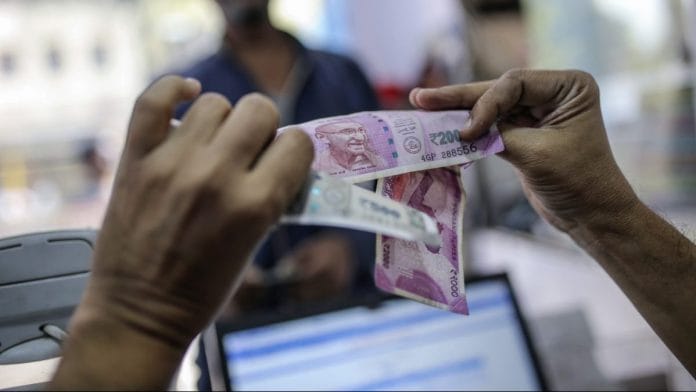New Delhi: Indian banks are staring at a massive increase in their non-performing loans due to the Covid-19 pandemic and this addition could be as high as Rs 10 lakh crore in 2020-21, according to former finance secretary Subhash Chandra Garg.
In a blog written Wednesday, Garg pointed out that nearly 80 per cent of the total bank credit was to sectors classified as non-essential and only 20 per cent of the credit was to industries classified as essential in the lockdown — food manufacturing and processing, electricity, gas and water, and IT and telecommunications.
Garg said the relief measures announced by the Reserve Bank of India in the form of a 3-month loan moratorium will only delay the recognition of the bad loan problem to a later date.
“The banks are granting moratorium to all credits irrespective of the nature of impact on their businesses and credit quality. Moratorium is also being allowed to the mortally wounded businesses as well. For such businesses, the moratorium granted by the RBI and insolvency process suspended by the government will only amount to keeping the show go on for some time,” he wrote, adding that the reality is “grim” and the RBI is aware of it.
“The banks have been asked to keep aside 10% of the gross amounts of such loans under moratorium as provisions. The can has been pushed down the road for the present,” he added.
According to analysts, the total NPAs (non-performing assets) in the banking system are estimated to be around Rs 9-10 lakh crore as of 31 March 2020.
Also read: Ashish Gupta, the man who predicted India’s banking crisis warns of new danger
Non-essential services hit the most
The Narendra Modi government first announced a three-week lockdown beginning 25 March and later extended it until 3 May. The lockdown forced many small businesses to permanently shut shop and large units to suspend production, leading to job losses.
Many migrant labourers have moved back to their villages unable to live in cities without a steady income.
While the government declared a Rs 1.7-lakh crore package comprising cash transfers to the poor and the vulnerable, the RBI announced a 3-month loan moratorium for all-term loans. Later, it announced measures for NBFCs (non-banking finance companies) and MSMEs (micro, small and medium enterprises) too.
Garg said the Covid-19 outbreak and the economic lockdown have impacted non-essential non-agricultural enterprises the most as they have completely stopped functioning for a month and resumption of their normal business may not happen soon.
“Some segments of non-essential businesses are massively impacted. These include retail with outstanding loans of 9.52 lakh crore, tourism, hotels, restaurants and recreation services with loans of Rs 0.92 lakh crore, construction with loans of Rs 7.40 lakh crore and textiles with loans of 2.37 lakh crore,” he said.
Also read: What crisis? HDFC Bank is ramping up corporate loans while rivals are retreating







This gentleman is like Aravind Subramanium, the ex chief economic adviser. Till they were inside the government, they saw nothing wrong with its working, and when they are out of it, they have decided “to speak their mind”. My point is, once a man has successfully demonstrated his ability to “suppress the truth”, or speak “half-truth”, then how can he be trusted to speak “nothing but the truth”?